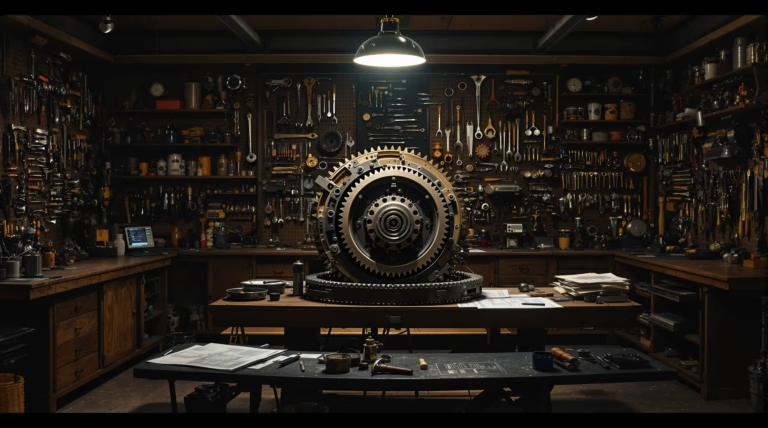Tooling Engineer: Role, Responsibilities, and Career Path
Looking to understand the crucial role of Tooling Engineers in modern manufacturing? Discover how these specialized professionals bridge the gap between product conception and mass production, and why they’re indispensable in today’s industrial landscape.
What is a Tooling Engineer?
A Tooling Engineer is a specialized professional who serves as a technical sourcing expert in the manufacturing industry. These professionals bridge the gap between product conception and mass production by defining product development potential and creating the necessary tools, fixtures, and equipment that enable efficient manufacturing processes. They are particularly valuable in scenarios where companies lack internal fabrication capabilities or the infrastructure to directly contract manufacturing work.
While traditional engineering roles might focus solely on product design, the modern Tooling Engineer often takes on a broader project management role. They oversee the entire lifecycle of tooling development, from initial concept through design, fabrication, testing, and implementation. Though technical design skills using software like SolidWorks are typically required, the position encompasses much more than just design work, requiring expertise in sourcing, vendor management, quality control, and production optimization.
Definition and Overview
A Tooling Engineer can be defined as a specialized engineer who designs, develops, and manages the tools, dies, fixtures, molds, and other equipment necessary for manufacturing products. They are technical specialists who understand both the theoretical aspects of engineering design and the practical requirements of production processes. These professionals typically work in industries where specialized equipment is needed to produce components at scale, such as automotive, aerospace, electronics, or consumer goods manufacturing.
The role crosses multiple disciplines, combining mechanical engineering principles, materials science, manufacturing technology, and project management. Unlike what some job descriptions might suggest, Tooling Engineers do far more than simply manage projects. They apply their technical expertise to solve complex manufacturing challenges, improve production efficiency, reduce costs, and ensure consistent product quality. Their work directly impacts a company’s ability to bring new products to market efficiently and maintain competitive manufacturing capabilities.
Importance in Manufacturing
Production tooling represents a critical link in the manufacturing value chain, serving as the foundation upon which mass production is built. Tooling Engineers create the molds, dies, jigs, fixtures, and other specialized equipment that enable consistent, repeatable, and efficient production of components. Without proper tooling, manufacturers would struggle to produce parts with the necessary precision, consistency, and throughput required for commercial viability.
- Reduces cycle times and minimizes material waste
- Decreases labor requirements and extends equipment life
- Provides competitive advantage through lower production costs
- Enables production flexibility and adaptability
- Integrates digital capabilities for smart factory concepts
Key Responsibilities of a Tooling Engineer
Tooling Engineers play a multifaceted role in the manufacturing ecosystem, often serving as the technical bridge between product development and mass production capabilities. Their responsibilities vary significantly depending on company size, industry, and organizational structure.
Design and Development of Tools
The design and development responsibilities of Tooling Engineers vary based on organizational context:
| Small Organizations | Large Corporations |
|---|---|
| Direct hands-on design work | Supervisory role in design process |
| CAD software utilization | Concept development |
| Complete tool creation | Vendor collaboration |
| Direct implementation | Technical evaluation |
Maintenance and Troubleshooting
Beyond initial design and implementation, Tooling Engineers bear significant responsibility for the ongoing performance of production tooling. They develop maintenance schedules and protocols to extend tool life and prevent costly production disruptions. When tools show signs of wear or begin producing out-of-specification parts, these engineers must quickly diagnose issues and implement solutions.
- Developing maintenance schedules and protocols
- Diagnosing and resolving tooling issues
- Analyzing performance data for improvements
- Managing vendor relationships for repairs
- Implementing continuous improvement initiatives
Collaboration with Other Departments
Tooling Engineers serve as vital interdepartmental connectors, fostering collaboration across multiple functions to align tooling solutions with organizational objectives. They work closely with product design teams to ensure manufacturability is considered from the outset, offering modifications that maintain product integrity while optimizing tooling requirements. Through regular engagement with production teams, they gain insights into real-world manufacturing challenges and develop solutions that enhance operational efficiency and product quality.
- Partner with procurement teams to establish technical specifications for vendor selection
- Collaborate with quality assurance to ensure tools meet production specifications
- Present tooling investment proposals to financial stakeholders with ROI analysis
- Act as technical translators between internal teams and external vendors
- Validate delivered tooling against specified requirements
Skills Required for a Tooling Engineer
Success in tooling engineering requires a specialized combination of technical expertise and practical manufacturing knowledge. These professionals must demonstrate strong mechanical aptitude alongside comprehensive understanding of materials, manufacturing processes, and tooling principles. Senior positions, particularly in specialized areas like injection molding and tool design, typically require 5-10 years of relevant experience coupled with formal engineering education.
| Core Technical Skills | Professional Competencies |
|---|---|
| CAD software proficiency (SolidWorks) | Project management |
| Manufacturing process knowledge | Vendor relationship management |
| Material science expertise | Cross-functional collaboration |
| Tool design principles | Problem-solving abilities |
Technical Skills
- Advanced proficiency in CAD software, particularly SolidWorks
- Mechanical engineering principles including material strength and thermal properties
- Process-specific expertise (injection molding, metal stamping, etc.)
- Manufacturing process optimization and quality control methodologies
- Automation integration and Industry 4.0 concepts
- CNC programming and automated testing equipment knowledge
Soft Skills
While technical prowess forms the foundation, soft skills significantly impact a Tooling Engineer’s effectiveness and career growth. Problem-solving abilities are essential for addressing complex challenges under tight deadlines, whether analyzing tooling failures, production inefficiencies, or quality issues. Strong communication skills enable these professionals to effectively convey technical concepts to diverse audiences, from operators to executives.
- Project management expertise for complex tooling development cycles
- Organizational skills and attention to detail
- Relationship management with vendors and stakeholders
- Adaptability and continuous learning mindset
- Time management and prioritization abilities
Educational Path and Certifications
The journey to becoming a tooling engineer typically begins with a structured educational foundation. A bachelor’s degree in engineering, particularly in mechanical, manufacturing, or industrial engineering, provides the necessary theoretical groundwork. While U.S. programs typically span four years, some countries offer three-year alternatives. These programs deliver comprehensive training in mathematics, physics, material science, and manufacturing principles.
Specialized knowledge in specific materials and processes enhances career prospects. Many successful professionals focus on areas such as plastics engineering, metal forming, or composites manufacturing. This specialized expertise becomes increasingly valuable as manufacturing technologies evolve, requiring continuous adaptation to both traditional and emerging production methodologies.
Educational Requirements
Most tooling engineer positions require a bachelor’s degree in an engineering discipline, with mechanical engineering being the most common pathway. While some professionals enter the field with backgrounds in manufacturing engineering, industrial engineering, or materials science, these programs provide the essential technical foundation for understanding complex mechanical systems and manufacturing processes.
- Core coursework includes computer-aided design (CAD)
- Manufacturing processes and methodologies
- Material science fundamentals
- Engineering mechanics principles
- Tool design and implementation
Practical experience significantly enhances employment prospects, with many successful professionals complementing their undergraduate studies through internships or co-op experiences at manufacturing facilities. While advanced degrees aren’t mandatory for entry-level positions, pursuing a master’s degree in specialized areas like advanced manufacturing, polymer processing, or tool design can accelerate career advancement, particularly for those aiming for leadership roles.
Certifications and Training
Industry-specific certifications and specialized training programs substantially enhance professional credentials beyond formal engineering degrees. Professional certifications validate expertise and demonstrate commitment to the field.
- Society of Manufacturing Engineers (SME) certifications:
- Certified Manufacturing Technologist (CMfgT)
- Certified Manufacturing Engineer (CMfgE)
- Software certifications:
- SolidWorks Professional
- Autodesk Certified Professional
- Specialized process training:
- Injection molding
- Progressive die design
- CNC programming
Career Path and Opportunities
The tooling engineering career path offers diverse opportunities across manufacturing sectors, including automotive, aerospace, consumer electronics, and medical devices. Success in this field stems from combining technical expertise with practical experience, while staying current with evolving manufacturing technologies and automation advances.
Entry-Level Positions
| Starting Role | Primary Responsibilities |
|---|---|
| Junior Tooling Engineer | CAD work, testing existing tooling, data collection and analysis |
| Tooling Technician | Supporting senior engineers, troubleshooting, maintenance |
| Molding Technician | Process-specific operations, quality control, basic maintenance |
| Die Maintenance Engineer | Tool maintenance, repair documentation, preventive care |
These entry-level positions serve as practical training grounds, allowing recent graduates to apply theoretical knowledge to real-world manufacturing challenges. After gaining three years of experience, professionals often transition into more advanced tooling engineering roles with increased responsibilities and technical complexity.
Advancement Opportunities
As Tooling Engineers gain experience and demonstrate technical proficiency, several advancement paths become available. The most direct progression leads to Senior Tooling Engineer positions, where professionals take on more complex projects, lead tooling design initiatives, and mentor junior team members. With 5-7 years of experience, many advance to Lead Tooling Engineer or Tooling Engineering Specialist roles, focusing on sophisticated tooling solutions for challenging manufacturing applications.
- Technical Leadership Path:
- Senior Tooling Engineer – complex project management and mentoring
- Lead Tooling Engineer – advanced technical decision-making
- Tooling Engineering Specialist – sophisticated solution development
- Management Path:
- Tooling Engineering Manager – team leadership and strategy
- Manufacturing Engineering Director – departmental oversight
- Alternative Paths:
- Independent consulting
- Specialized vendor roles
- Engineering service firm ownership
Salary Expectations for Tooling Engineers
Tooling Engineers command competitive compensation reflecting their specialized skills and critical role in manufacturing operations. While related roles like machinists and tool and die makers earn a median of $53,180 annually ($25.57 per hour), Tooling Engineers typically receive higher compensation due to their advanced technical expertise and broader responsibilities.
Factors Influencing Salary
| Factor | Impact on Compensation |
|---|---|
| Experience Level | Primary driver, with 7-10 years specialized experience commanding premium rates |
| Industry Sector | Aerospace, medical device, and specialized automotive typically offer higher compensation |
| Geographic Location | Engineering hubs and high cost-of-living areas provide better packages |
| Educational Qualifications | Advanced degrees and certifications often lead to higher starting offers |
| Company Size | Larger organizations offer standardized compensation; smaller firms provide broader responsibilities |
Average Salary Range
- Entry-level (0-3 years): $60,000 – $70,000
- Mid-career (5-7 years): $75,000 – $90,000
- Senior level (10+ years): $100,000+
Comprehensive compensation packages typically include performance bonuses, profit-sharing opportunities, and benefits addressing both immediate needs and long-term security. International assignments or roles requiring extensive travel often offer premium pay structures, including salary differentials and housing allowances, reflecting the strategic importance of tooling expertise in manufacturing operations.







